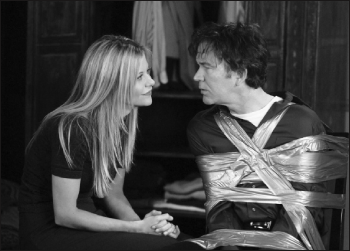By Elena Mancini
This is the most torturous wannabe screwball comedy since Debra Messing stopped doing sitcoms. Containing all of the elements of yet another comedic drama about the war of the sexes, the plot is centered on the failing marriage between Louise and Ian, a white, privileged 40-something who own a vacation home in the country.
Louise, an alpha-femme attorney-type (played by Meg Ryan) is shocked to discover that her husband (Timothy Hutton) is about to leave her for a much younger woman (Kirsten Bell). This causes the high-powered lawyer to resort to horrifyingly desperate measures that border on the deranged in the name of holding on to her man. For a few brief moments, the script takes an interesting detour into fleshing out the dynamics of marital domesticity and attraction — but it proceeds to marshal every tedious gender cliché that affirms “till death do us part” overrides spousal humiliation, disappearance of feeling and the utter degeneration of mutual respect.
Motivating Louise’s pathetic acts is not love, but the fear of becoming a woman in her mid forties who’s alone and winds up “bonding with her girlfriends and becoming addicted to ice cream.” As though plying and coercing a cowardly man who has fallen out of love with her poses such a better alternative. She resorts to violence, crackpot schemes and every cliché in the book of traditional feminine wiles to get Ian to stay put — including baking a fresh batch of cookies and flaunting her cleavage at him. At any moment while watching these formulaic scenes unfold, one expects her to go hysterical over breaking a fingernail, fawn over a pair of shoes or rant about PMS. The movie dragged on in this inane, over-the-top, yet predictable fashion for what seemed to be an eternity. Ian’s occasionally zingy repartee in the beginning offered seconds of comic relief, but nothing that even remotely resembles the sharpness and wit of “The War of The Roses” — Danny DeVito’s brilliant 1989 comedy of conjugal love-hate.
Hutton’s performance was light, humorous and interspersed with appropriate bits of irony,; but not all of the world’s cumulative acting talent would have been capable of redeeming a script so doomed from the outset.
Ryan, who has built an acting career around her ability to pout and whose sweet features lend themselves beautifully to play the capricious ingénue, is not the least bit convincing as a high-powered attorney. The roles that the former America’s Sweetheart has taken of late have had her portraying bitter suburban female victim types caught in all of the trappings of privilege and consumption. In last year’s remake of George Cukor’s “The Women,” she played an affluent wife, and her role in this film (comedy or not) is in many ways also a reprisal of the tired negative feminine stereotypes. In “Serious Moonlight,” Ryan plays Louise like a faux ingénue with a vengeful sadistic streak. The sadism, which is overacted, is not the least bit charming or sexy, for that matter.
Meanwhile, her spineless husband Ian attributes his descent from sensitive man to cad to his (pause for a big sob) no longer feeling needed by Louise. Louise not only earns more than he, she can also bench press more than he. Here in Ian’s lamentation of masculinity lost, we are presented with pop psychology analysis of why contemporary gender relations are so complicated: men feel threatened by powerful females.
As tradition and gender stereotypes would dictate, the female downplays her independence and Louise resorts to criminal farces and damsel-in- distress antics just to win back her man from the male ego-affirming clutches of his hot, young, dimwitted mistress. While the overriding message might stoke some of the passions of traditional marriage advocates and romantic saps, the rest of us are left with a regressive Hollywood tale that makes no qualms about infringing upon a century of organized feminism by encouraging them to downplay their strengths, and tolerate male weakness in the name of attaining the so-called “happy end.” Better avoid this one, but if you must see for yourself, don’t bring your daughters.







































